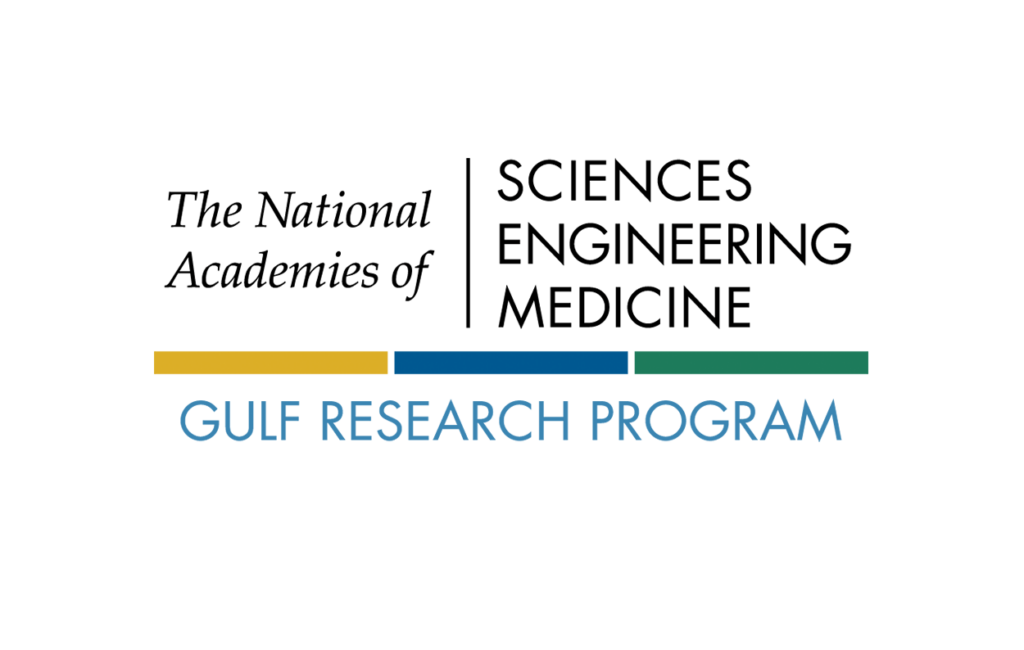For immediate release: 11 a.m. Wednesday, June 13. Provided by Gulf Research Program with added section from Mote Marine Laboratory.
National Academies’ Gulf Research Program awards over $287,000 to assist scientific research impacted by Hurricanes Harvey and Irma
WASHINGTON – The Gulf Research Program (GRP) of the National Academies of Sciences, Engineering, and Medicine today announced 11 grant awards totaling $287,565 to assist in the recovery of Gulf of Mexico region scientific research efforts impacted by hurricanes Harvey and Irma. These awards are the result of the second of two fast-track grant cycles for Scientific Research Disaster Recovery Grants announced last November to help with repair, replacement or recovery of equipment, data or other research materials damaged or lost as a result of the hurricanes and their aftermaths.
“As the 2018 hurricane season gets underway, it’s a good time to remember the significant impacts from last year’s hurricanes and that the recovery process is still underway for many,” said Maggie Walser, director of education and capacity building for the GRP. “In the aftermaths of Harvey and Irma last year, the GRP set out to contribute what it could to help that recovery through a unique niche of offering grants to help scientists whose research was affected by the hurricanes pick up the pieces and carry on with work in areas that could ultimately help the Gulf region build resilience against future hurricanes.”
—

Bassos-Hull is coordinating the multi-institution project “Wiring the Bay”: Developing an Acoustic Sensing Network for Sarasota Bay and Surrounding Waters. The GRP grant will help replace lost acoustic receivers used by partners to detect multiple animal species fitted with acoustic tags. Protect partners investigate the movements, habitat use and/or behavior of spotted eagle rays, common snook, bull sharks, bottlenose dolphins and blacktip sharks.
“We sincerely thank the National Academies’ Gulf Research Program for supporting the replacement of our acoustic receivers lost during Hurricane Irma,” Bassos-Hull said. “These receivers are critical components of a monitoring network in our region, and the knowledge we gain from them is priceless. The joint project ‘Wiring the Bay’ is expanding our understanding of Sarasota Bay and the Gulf of Mexico ecosystem and associated fishery resources, which are of major economic importance to our region.”
—
Affected scientists whose research pertains to the GRP’s focus on enhancing human health, environmental resources, and offshore energy safety in the Gulf of Mexico region were eligible to apply for grants of up to $50,000.
The other 10 awardees for the second cycle, listed in alphabetical order by recipient last name, are:
Aaron Adams (Bonefish and Tarpon Trust)
Award: $29,800 to replace monitoring equipment used in a long-term effort tracking populations of two coastal fish species, permit and Atlantic tarpon, to inform fisheries and habitat management. The equipment was lost as a result of Hurricane Irma.
Bruce Barber (Gulf Shellfish Institute Inc.)
Award: $33,106 to support the recovery of a research project examining the relationships between filter-feeding bivalves, water quality, sediment quality and seagrass distribution. Hurricane Irma caused significant losses of clam specimens and related support equipment at the project’s experiment site.
Bernard Castillo II (University of the Virgin Islands)
Award: $38,053 to support the recovery of a research project examining factors that affect the movement and colonization of areas by lionfish, an invasive species in the U.S. Virgin Islands. Impacts from Hurricane Irma contributed to project delay, resulted in lost equipment, and necessitated new data collection due to major disruptions to study areas.
Charles Cotton (Florida State University)
Award: $11,060 to replace and deploy equipment used to support long-term monitoring of animal movements in the Apalachicola Bay in the northeastern Gulf of Mexico. The equipment, which provides data to a variety of research efforts, was lost during Hurricane Irma.
Katy Cummings (Florida Fish and Wildlife Conservation Commission)
Award: $9,716 to replace equipment used to support long-term monitoring of coral reefs off the coasts of southern Florida. The equipment was lost as a result of Hurricane Irma.
Darren Henrichs (Texas A&M University)
Award: $30,459 to replace equipment and restore operations of a system that monitors for harmful algae blooms along the Texas coast. The system has been offline since Hurricane Harvey due to storm-incurred losses.
Adeljean Ho (Bethune-Cookman University)
Award: $46,500 to support recovery of a research and demonstration project to evaluate and promote the effectiveness of using living shorelines to reduce nonpoint source pollution from urban runoff. Project sites were significantly damaged by Hurricane Irma and require reconstruction.
Stephen Kajiura (Florida Atlantic University)
Award: $6,175 to replace equipment used to support long-term monitoring of animal movements along southeastern Florida. The equipment, which provides data to a variety of research efforts, was lost during Hurricane Irma.
Larry Lloyd (Texas A&M University – Corpus Christi)
Award: $23,833 to replace equipment and restore a water quality monitoring platform in San Antonio Bay. The platform, which provides data to a variety of research and environmental management efforts, was damaged during Hurricane Harvey.
Norton Orange (OrangeWave Innovative Science, LLC)
Award: $50,000 to replace equipment and restore a network of environmental monitoring stations in the U.S. Virgin Islands. Impacts from Hurricane Irma contributed to destruction of the monitoring stations, which provide data to a variety of research efforts.
Eleven grant awards totaling $341,283 were announced in April for the first cycle of the GRP’s Scientific Research Disaster Recovery Grants. A total of 22 awards amounting to $628,848 have been made for both cycles.
These awards are part of the portfolio of Gulf Research Program funding opportunities outlined at national-academies.org/gulf/grants.
The National Academies’ Gulf Research Program is an independent, science-based program founded in 2013 as part of legal settlements with the companies involved in the 2010 Deepwater Horizon disaster. It seeks to enhance offshore energy system safety and protect human health and the environment by catalyzing advances in science, practice and capacity to generate long-term benefits for the Gulf of Mexico region and the nation. The program has $500 million for use over 30 years to fund grants, fellowships and other activities in the areas of research and development, education and training, and monitoring and synthesis. Visit national-academies.org/gulf to learn more.
The National Academies of Sciences, Engineering, and Medicine are private, nonprofit institutions that provide independent, objective analysis and advice to the nation to solve complex problems and inform public policy decisions related to science, technology and medicine. The Academies operate under an 1863 congressional charter to the National Academy of Sciences, signed by President Lincoln. For more information, visit national-academies.org.
Mote Marine Laboratory’s media contact: Hayley Rutger, 941-374-0081, hrutger@mote.org
Media contacts from the National Academies of Sciences, Engineering, and Medicine:
Kacey Templin, Media Relations Officer
Joshua Blatt, Media Relations Assistant
Office of News and Public Information
202-334-2138; e-mail news@nas.edu


